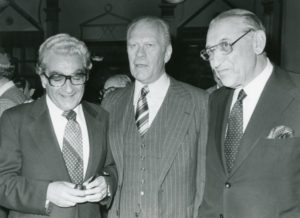Dulzin Says There Is a Fear that Soviet Jews Will Once Again Become the ‘Silent Jewry,’ JTA, Jan. 27, 1982.
 The presidium of the World Conference on Soviet Jewry, comprising 65 Jewish leaders from 14 countries, began a three-day meeting here today overshadowed by the concern that the Soviet government is cutting off emigration by Jews from the Soviet Union.
The presidium of the World Conference on Soviet Jewry, comprising 65 Jewish leaders from 14 countries, began a three-day meeting here today overshadowed by the concern that the Soviet government is cutting off emigration by Jews from the Soviet Union.
The meeting, the first of the presidium’s semi-annual sessions to be held in Washington, will end Thursday afternoon with a meeting with Vice President George Bush.
There is a fear that the Soviet Jews will once again become the “silent Jewry,” Leon Dulzin, chairman of the World Conference, said in an interview with the Jewish Telegraphic Agency.
Jewish emigration, which rose to more than 51,000 in 1979, trickled down to only 9,447 last year. Dulzin noted that at the same time, there has been a sharp increase in the number of “hardcore” refuseniks, Jews who have been denied exit visas more than once and who have thus suffered the loss of jobs and have been subject to harassment of various kinds.
In January 1980, there were 2,984 refuseniks, Dulzin said. The number rose to 4,741 by January 1981 and 5,798 by last September. At the same time, he pointed out, the Soviet government is not allowing the necessary affidavits from Israel to reach Soviet Jews who want to apply for exit visas.
Aim of the Meeting
Dulzin, who is also chairman of the World Zionist Organization and the Jewish Agency Executives, said that the meeting here this week is aimed at arousing public opinion again for the cause of Soviet Jewry. It is also to demonstrate to Soviet Jewry that “we are not neglecting them and will continue the struggle,” he said.
One decision that is expected to come out of the meeting is to hold is third Brussels conference on Soviet Jewry either this year or early next year, Dulzin said. At the first conference in 1971, world public opinion on Soviet Jewry was coordinated. The second in 1976, was held after the Soviet government placed an “education tax” on emigrants. It was repealed later.
Dulzin said that since the first Brussels conference, some 260,000 Jews have emigrated from the USSR, 185,000 of them settling in Israel. But, he said, since 1979, the peak year for emigration, there has been a problem of Noshrim (“dropouts”). Last year 85 percent of the Jews who left the Soviet Union went to some other country than Israel, Dulzin said. He blamed the dropout problem in part for the Soviet clampdown on emigration since, he said, the USSR did not want the Jews to go to the United States.
Other Countries Where Jews Are in Danger
Beside the Soviet Union, Dulzin said there were three other countries where Jews were in danger — Iran, Ethiopia and Syria. In Ethiopia, Dulzin said “we are doing everything possible to save” the Falashas who face extermination, and bring them to Israel.
In the other countries, there was little that could be done now, he said. He said the Iranian Jews were suffering along with the rest of the population of Iran. There is concern for the suffering of the 4,000 Jews left in Syria, Dulzin said, but the government there would not allow them to leave.
Dulzin said there was no Jewish problem in Poland despite the anti-Semitic attitude of the government because there were so few Jews left in the country. He said the Polish government’s charges that Zionists were behind the opposition to the Communist rulers is proof that anti-Semitism and anti-Zionism are the same thing. He said the Polish government was still using anti-Semitism “even if you don’t have Jews there.”
As for South America, Dulzin said that he did not believe that Jews there were in danger, at least in the short term. Of course, he added, “we would like the Jews of South America to come to Israel.”



